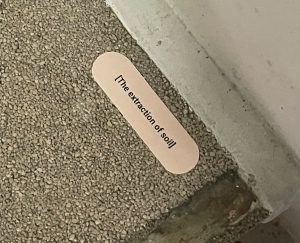[The extraction of time]
It’s a sunny Saturday afternoon on the 26th of February, as I make my way up the stairs of a round shaped former office building on the Donauweg in Sloterdijk. A building that was once the residency of Serbian and Polish construction workers.
But not today, today it’s a place for collectivizing. A place for gathering thought and action. Home of the self-organized exhibition Time is an unrenewable resource – and you know how we are with those by six emerging artists in Amsterdam; Iskra Vukšić, Maisa Imamović, Ekaterina Volkova, Natalia Blahova, Roman Tkachenko and Lena Karson.

As I make my way up the circular stairs, my feet meet words placed on the ground. I’m reminded of the time slipping away with each step as I move deeper into the clockwork of the exhibition.
[The extraction of soil]
This is an exhibition about the refusal to wait in a period where waiting seems to be all anyone is allowed to do. The space, the work, the people: All of them demand the recognition of resources being wasted and blatantly show how deep extractivism is ingrained into our language, our bodies, the way we spend time, our political processes and the materials required for artistic work.
Laborious drawings of enormous size fill the space. Created with painstaking detail, in hours suddenly emptied by the pandemic.
A videogame forces visitors to grapple with the struggle between investment and return in a haltering tourist industry. Showcasing the many workers that remain trapped in the precarious tension between work and wait, the visitor plays a waiting game.
A video work, Negotiation plot, explores the power dynamics embedded in land ownership.
A one woman lecture-performance “INTRO: the problem” delves into the trouble of translating thought into words.
Vessels from extracted clay and pigments are slowly decomposing underneath a dripping shower, eventually flushing small particles of clay down the drain. The work reflects on the lingering presence of the buildings’ former residents – Eastern European construction workers.
[The extraction of language]
On this particular Saturday afternoon, the exhibition is accompanied by a symposium on artist self-organization. A diverse range of Amsterdam-based initiatives sit around a table to discuss urge, internal relations and inter/independence of self-organizing. People from W139, Hotel Mokum, Reneenee, Dead Darlings, 4Bid Gallery and many more cultural parties discuss precarity in the Amsterdam art scene, the complete lack of space and the urgent need for action. I’m reminded of a quote by Priya Parker:
“The way we gather matter. Gatherings consume our days and help determine the kind of world we live in, in both our intimate and public realms. Gathering—the conscious bringing together of people of a reason—shapes the way we think, feel and make sense of our world. Lawgivers have understood the power inherent in gatherings. In democracies, the freedom to assemble is one of the foundational rights granted to every individual. In countries descending into authoritarianism, one of the first things to go is the right to assemble. Why? Because of what can happen when people come together, exchange information, inspire one another, test out new ways of being together.”
Can’t deny—
It feels so good to be together.
[The extraction of labour]
The artists here are all undeniably gatherers. They have aggregated disparate pieces of a near broken art ecosystem and carefully fashioned them into a new container, taking the shape of an exhibition and symposium.
It’s a rather hopeful little basket, brimming with energy to make an end to all the waiting and wasting and extracting.
Fuck that next open call, nothing but a capitalistic Ponzi scheme forcing further individualization. I don’t want to compete. I want to gather; I want to collectivize.
If this is what comes out of it—
Then maybe precariousness isn’t all that bad after all.
[The extraction of self]

